Key takeaways
- Pink Floyd’s music combines experimental soundscapes with emotional storytelling, creating immersive listening experiences that resonate across generations.
- Their innovative approach redefined rock music by blending progressive and psychedelic elements, influencing numerous subgenres and encouraging artistic boldness in others.
- Albums like “The Dark Side of the Moon” and “The Wall” showcase thematic depth and continuity, transforming music into a profound emotional journey.
- Pink Floyd’s fan community fosters deep connections and shared experiences, highlighting the band’s role as a source of comfort and understanding for listeners.
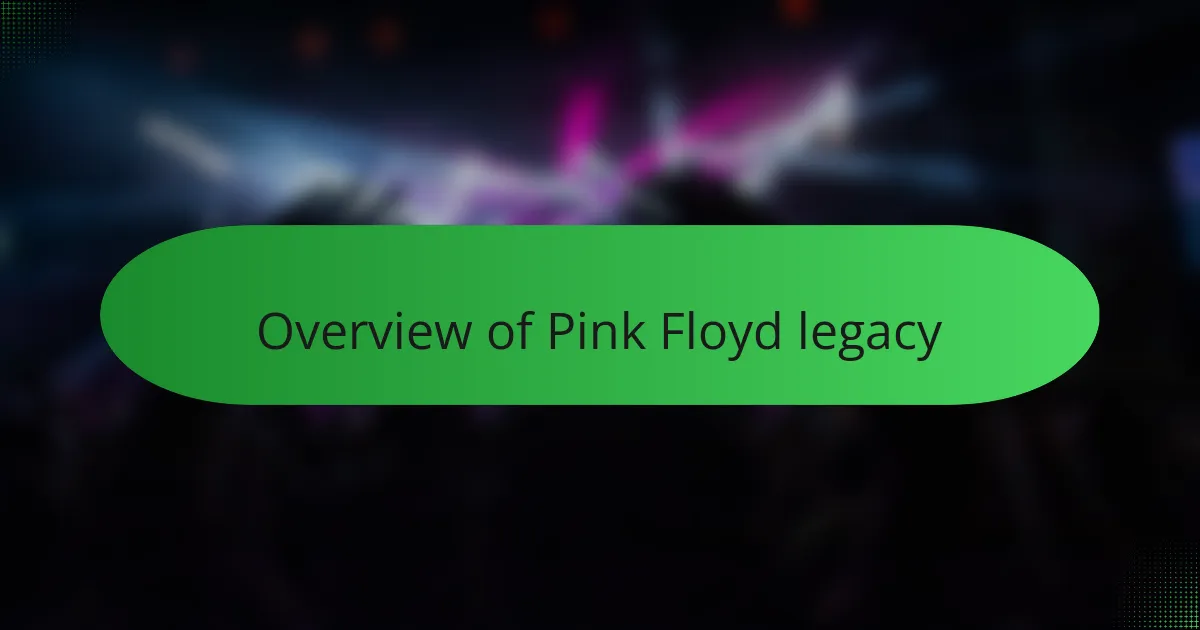
Overview of Pink Floyd legacy
Pink Floyd’s legacy is nothing short of monumental in the world of rock music. Their ability to blend experimental soundscapes with deeply emotional storytelling still moves me every time I listen. Have you ever found yourself lost in the atmospheric layers of “Echoes” or the haunting themes of “The Wall”? That immersive experience is precisely what makes their work timeless.
What strikes me the most is how Pink Floyd pushed boundaries—not just musically but conceptually too. Their albums weren’t just collections of songs; they were journeys that challenged listeners to think differently about society, mental health, and human connection. This willingness to innovate is something I admire deeply, as it shows how art can evolve without losing its emotional core.
In reflecting on their legacy, I can’t help but feel a personal connection to their music. It’s like they composed soundtracks for some of life’s most complex moments—times of struggle, reflection, or even celebration. Isn’t that the true mark of a legendary band? They don’t just entertain; they resonate across generations.
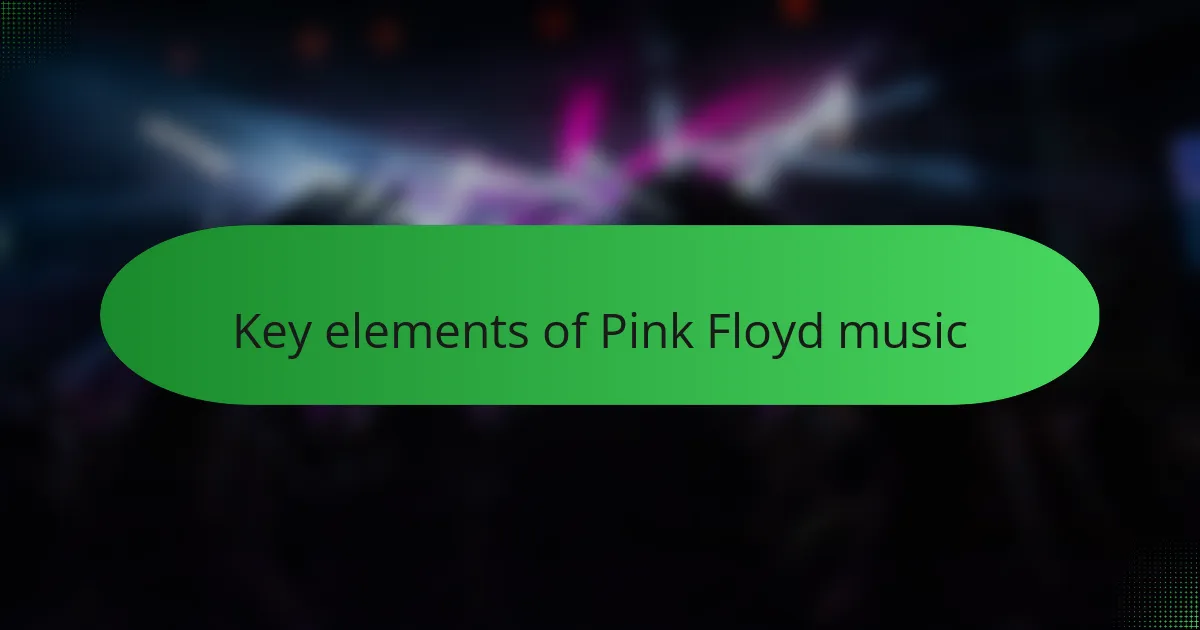
Key elements of Pink Floyd music
What stands out to me about Pink Floyd’s music is their masterful use of atmosphere. The way they layer sounds—whether it’s David Gilmour’s soulful guitar solos or Richard Wright’s haunting keyboard melodies—creates these vast sonic landscapes that feel almost otherworldly. Have you ever noticed how you can close your eyes and feel like you’re drifting through space when listening to tracks like “Shine On You Crazy Diamond”? That immersive quality is a key element that keeps me coming back.
Another aspect I deeply appreciate is their meticulous attention to detail in production. The subtle use of sound effects, from the ticking clocks in “Time” to the children’s voices in “The Wall,” adds so much depth and narrative context. It’s not just about catching a groove; it’s about painting a vivid audio picture that tells a story in itself. This attention to sonic storytelling is something I think many modern bands could learn from.
Finally, there’s the emotional intensity embedded in their compositions. Pink Floyd managed to merge technical prowess with raw feeling, creating music that touches something deep inside. It makes me wonder, how many bands can claim to make you feel both the fragility and the power of the human experience through sound alone? For me, that emotional honesty is what defines their sound above all else.
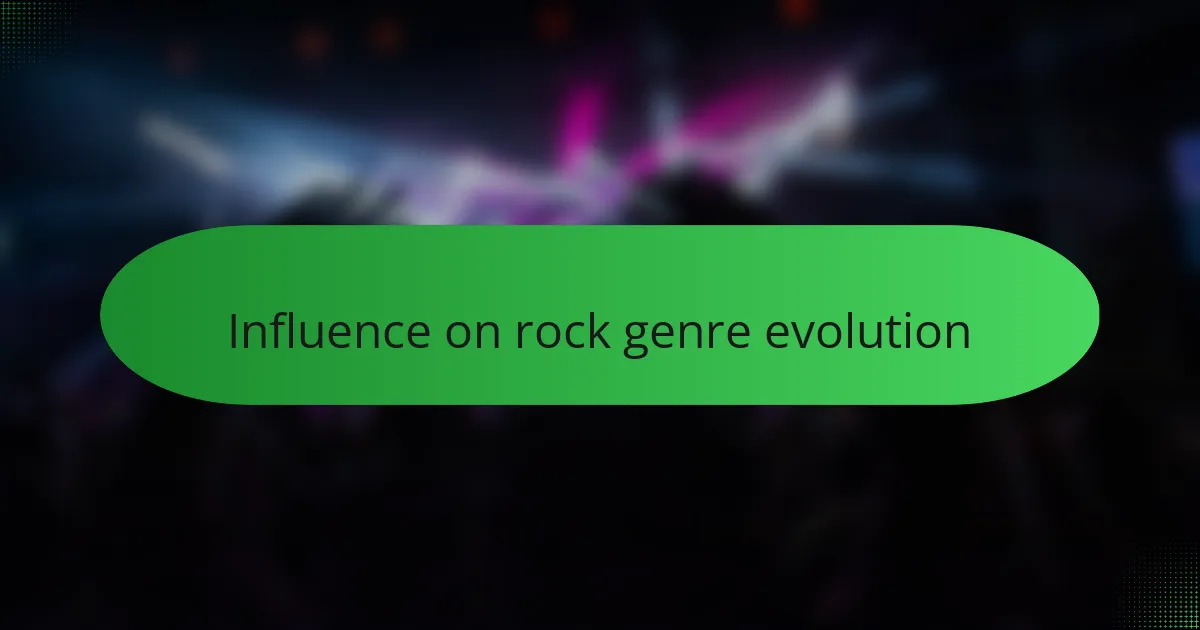
Influence on rock genre evolution
Pink Floyd’s impact on the evolution of rock music is, in my view, nothing short of revolutionary. They didn’t just play rock; they redefined what it could be by blending progressive structures with psychedelic elements and conceptual depth. When I first heard their albums, it felt like discovering a whole new dimension of what rock could express.
What fascinates me is how their experimentation opened doors for so many subgenres, from progressive rock to art rock. Their willingness to break away from traditional song formats challenged other artists to be bolder and more imaginative. Have you ever noticed how many bands seem to draw inspiration from Pink Floyd’s sonic adventurousness and narrative ambition? That ripple effect is still alive today.
I think one of the most profound influences they had was showing that rock could be an immersive experience, not just a series of catchy songs. Their use of studio technology and thematic cohesion created a template that many bands still aspire to. Listening to Pink Floyd made me realize rock music could be both cerebral and deeply emotional, a balance that wasn’t common before they came along.
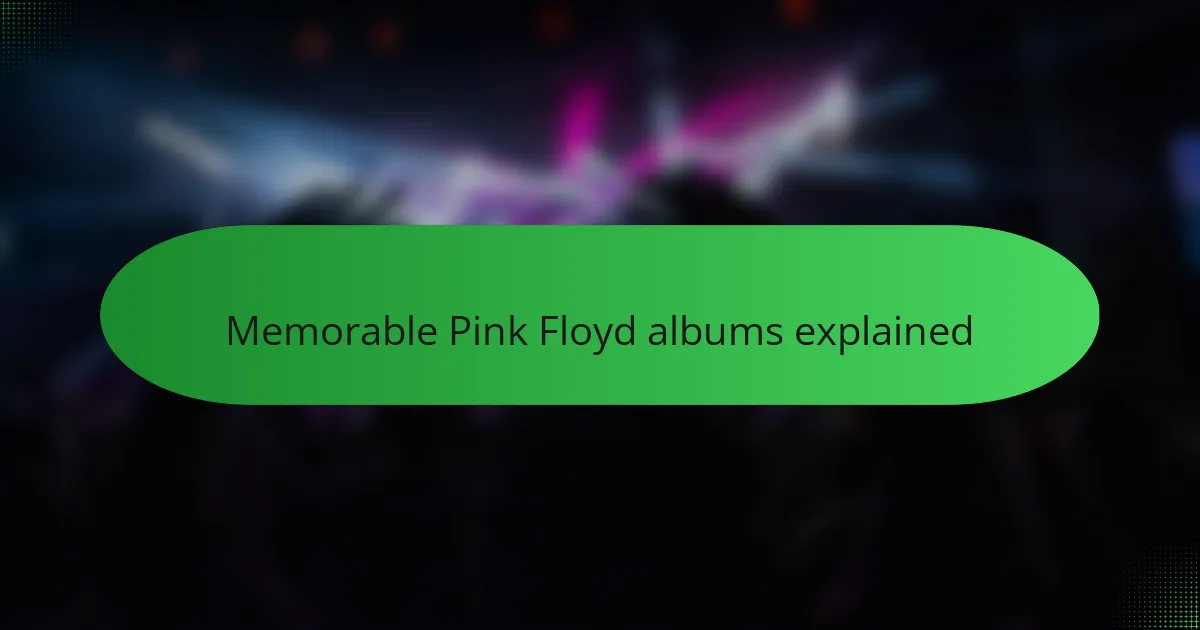
Memorable Pink Floyd albums explained
When I think about Pink Floyd’s albums, “The Dark Side of the Moon” immediately comes to mind. Its seamless flow and themes of time, pressure, and mortality hit me in a way few albums have. Have you ever paid close attention to how every track seems to bleed into the next, creating a continuous journey? That kind of album craft feels almost rare today.
Then there’s “Wish You Were Here,” which resonates deeply because of its tribute to Syd Barrett and the exploration of absence and connection. The way “Shine On You Crazy Diamond” unfolds always makes me pause and reflect on creativity and loss. Isn’t it powerful how an album can feel like a heartfelt letter rather than just a playlist?
Of course, “The Wall” stands out for its sheer ambition and emotional weight. Listening to it feels like stepping into someone’s personal struggle with isolation and madness. I remember the first time I experienced its narrative arc from start to finish; it was more than music—it was a cathartic encounter. Have you ever had an album that moved you that profoundly? For me, “The Wall” tops that list every time.

Personal experiences with Pink Floyd songs
Some of my most vivid memories with Pink Floyd’s music are tied to quiet moments alone, where the opening notes of “Comfortably Numb” seem to wash away everything else. Have you ever had a song that feels like it’s narrating the unrest inside you? For me, that song has a way of reaching deep and making the intangible feel understandable.
I also recall the first time I played “Time” while watching a sunset. The ticking clocks and the gradual build-up in the track matched perfectly with the fading light, and it made me realize how Pink Floyd can connect music and life experiences so seamlessly. Isn’t it fascinating how a song can become part of a moment, almost like a soundtrack to your own stories?
Sometimes, when life feels overwhelming, I turn to “Wish You Were Here” and find a strange comfort in its melancholy. The way it captures feelings of absence and longing speaks to shared human experiences. Do you ever find yourself revisiting songs because they say what you find hard to express? For me, Pink Floyd’s music often fills those gaps.
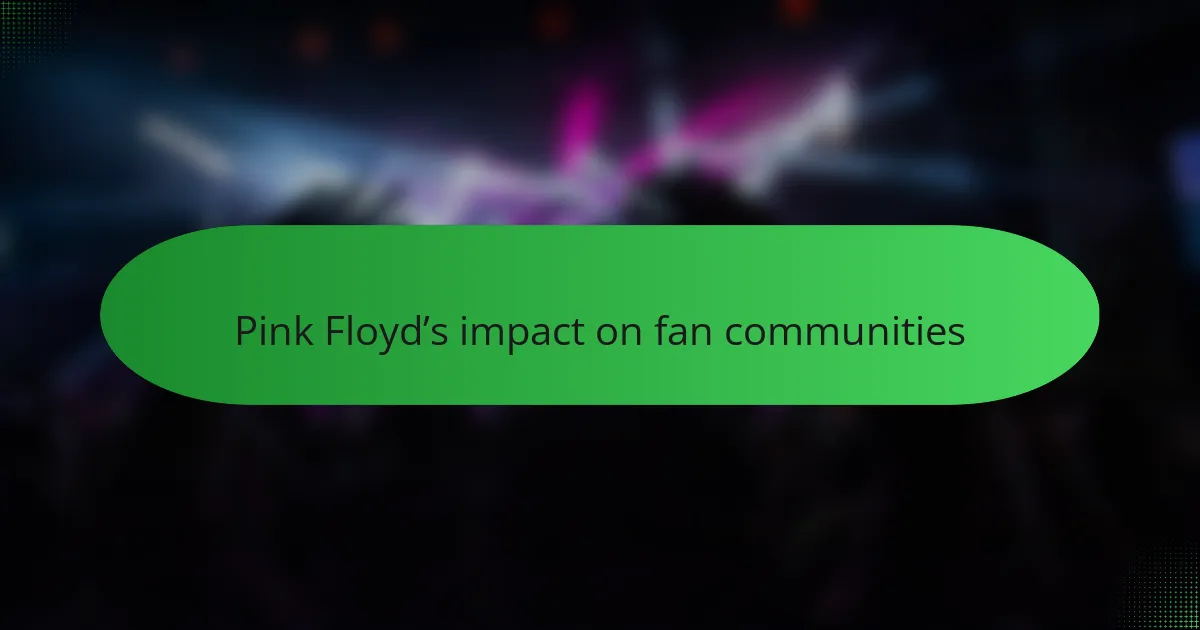
Pink Floyd’s impact on fan communities
Pink Floyd’s impact on fan communities goes beyond just shared music taste; it creates a profound sense of belonging. I’ve seen fans connect deeply over discussions about the meanings behind their albums, often forming lifelong friendships through online forums and meetups. Isn’t it amazing how a band’s artistic vision can build bridges between strangers?
What I find particularly striking is the way Pink Floyd fans engage with the music as an experience rather than just entertainment. Many fans host listening sessions or tribute nights where the emphasis is on immersing in the soundscapes and themes together. This collective appreciation turns listening into a social ritual, which, in my view, strengthens the community’s bond and keeps the legacy alive.
From personal experience, the fan community feels like an extended family where emotions tied to albums like “The Wall” or “Dark Side of the Moon” are openly shared and respected. I often find myself amazed at how fans openly express struggles and triumphs inspired by the band’s music, showing how Pink Floyd isn’t just a soundtrack but a source of comfort and understanding for many. Have you ever found a fan community that feels more like home? For me, this is exactly what Pink Floyd has created.
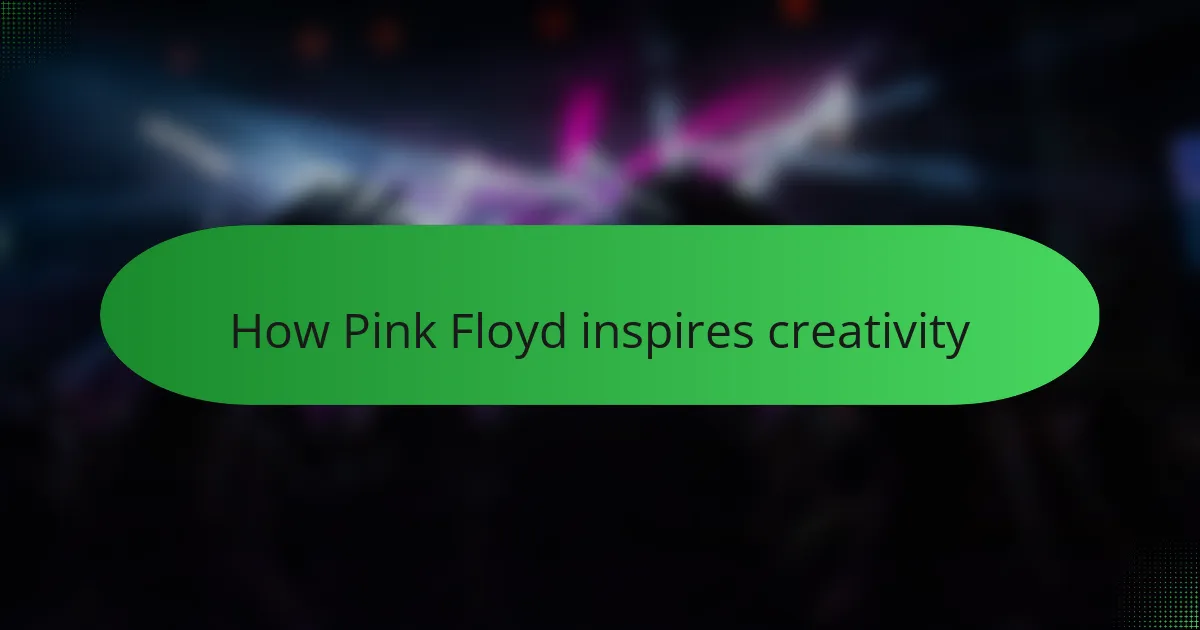
How Pink Floyd inspires creativity
Pink Floyd’s approach to music has always sparked my own creative thinking. Their fearless blending of sounds encourages me to experiment without fear of failure, reminding me that pushing boundaries often leads to the most rewarding artistic moments. Have you ever felt stuck creatively, only to find inspiration in how they weave unconventional sounds into something beautiful?
I also admire how their storytelling invites listeners to explore complex emotions through music. It’s like they provide a canvas where your imagination can roam freely, making me realize creativity isn’t just about skill but about emotional honesty. When I listen to “Shine On You Crazy Diamond,” I don’t just hear instruments—I experience a story that fuels my own creative projects.
What truly stands out is how Pink Floyd’s music challenges the conventional structure of songs. Their willingness to create immersive journeys rather than radio-ready hits pushes me to think beyond formulas and embrace originality. Have you ever tried creating something new and found that breaking the rules brought your best work? For me, Pink Floyd’s innovation is a constant reminder to trust the creative process, wherever it leads.